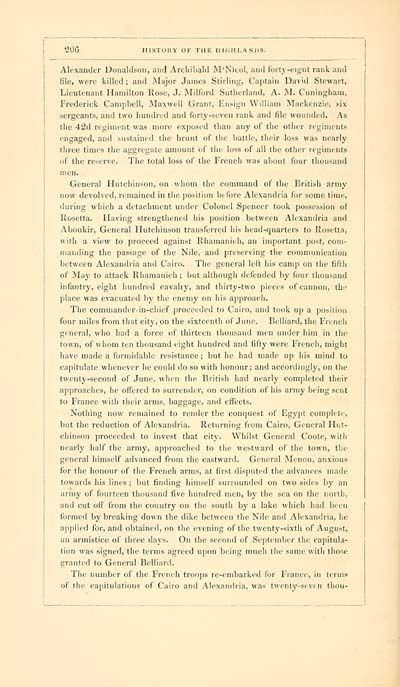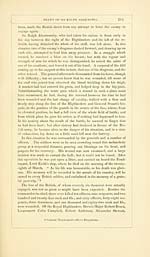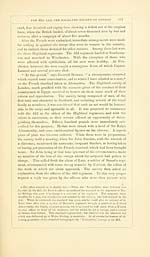Download files
Complete book:
Individual page:
Thumbnail gallery: Grid view | List view

20G HISTOKY OF THE HICiflLANDS.
Alexander Uonaldson, aiij Archibald M'NicoI, and forty-eignt rank and
file, were killed ; and Major James Stirling, Captain David Stewart,
Lieutenant Hamilton Rose, J. INIilford Sutherland, A. M. Cuningham,
Frederick Cani]ibcll, Maxwell Grant, Ensign William Mackenzie, six
sergeants, and two hundrtd and forty-seven rank and file wounded. As
the 42d regiment was more exposed than any of the other regiments
engaged, and sustained the brunt of the battle, their loss was nearly
three times the aggregate amount of the loss of all the other regiments
of the reserve. The total loss of the French was about four thousand
men.
General Hutchinson, on whom the command of the British army
now devolved, remained in the position before Alexandria for some time,
during which a detachment under Colonel Spencer took possession of
Koselta. Having strengthened his position between Alexandria and
Aboukir, General Hutchinson transferred his head-quarters to Rosetta,
with a view to proceed against Rhamanieh, an important post, com-
manding the passage of the Nile, and preserving the communication
between Alexandria and Cairo. The general left his camp on the fifth
of Maj' to attack Rhamanieh; but although defended by four thousand
infantry, eight hundred cavalry, and thirty-two pieces of cannon, the
place was evacuated by the enemy on his approach.
The commander-in-chief proceeded to Cairo, and took up a position
four miles from that city, on the sixteenth of June. Relliard, the French
general, who had a force of thirteen thousand men under him in the
town, of whom ten thousand eight hundred and fifty were French, might
have made a formidable resistance; but he had made up his mind to
capitulate whenever he could do so with honour; and accordingly, on the
twenty-second of June, when the British had nearly completed their
approaches, he offered to surrender, on condition of his army being sent
to France with tlieir arms, baggage, and eftects.
Nothing now remained to render the conquest of Egj'pt complete,
but the reduction of Alexandria. Returning fioni Cairo, General Hut-
chinson proceeded to invest that city. Whilst General Coote, with
nearly half the army, approached to the westward of the town, the
general himself advanced from the eastward. General Menou, anxious
for the honour of the French arms, at first disputed the advances made
towards his lines ; but finding himself surrounded on two sides by an
army of fourteen thousand five hundred men, by the sea on the north,
and cut ofl' from the country on the south by a lake which had been
formed by breaking down the dike between the Nile and Alexandria, he
applied for, and obtained, on the evening of the twenty-sixth of August,
an armistice of three days. On the second of September the capitula-
tion was signed, the terms agreed upon being much the sam.e with those
grante<l to General Belliard.
The number of the French troops re-embarked for France, in terms
of the capitulations of Cairo and Alexandria, was twenty-seven thou-
Alexander Uonaldson, aiij Archibald M'NicoI, and forty-eignt rank and
file, were killed ; and Major James Stirling, Captain David Stewart,
Lieutenant Hamilton Rose, J. INIilford Sutherland, A. M. Cuningham,
Frederick Cani]ibcll, Maxwell Grant, Ensign William Mackenzie, six
sergeants, and two hundrtd and forty-seven rank and file wounded. As
the 42d regiment was more exposed than any of the other regiments
engaged, and sustained the brunt of the battle, their loss was nearly
three times the aggregate amount of the loss of all the other regiments
of the reserve. The total loss of the French was about four thousand
men.
General Hutchinson, on whom the command of the British army
now devolved, remained in the position before Alexandria for some time,
during which a detachment under Colonel Spencer took possession of
Koselta. Having strengthened his position between Alexandria and
Aboukir, General Hutchinson transferred his head-quarters to Rosetta,
with a view to proceed against Rhamanieh, an important post, com-
manding the passage of the Nile, and preserving the communication
between Alexandria and Cairo. The general left his camp on the fifth
of Maj' to attack Rhamanieh; but although defended by four thousand
infantry, eight hundred cavalry, and thirty-two pieces of cannon, the
place was evacuated by the enemy on his approach.
The commander-in-chief proceeded to Cairo, and took up a position
four miles from that city, on the sixteenth of June. Relliard, the French
general, who had a force of thirteen thousand men under him in the
town, of whom ten thousand eight hundred and fifty were French, might
have made a formidable resistance; but he had made up his mind to
capitulate whenever he could do so with honour; and accordingly, on the
twenty-second of June, when the British had nearly completed their
approaches, he offered to surrender, on condition of his army being sent
to France with tlieir arms, baggage, and eftects.
Nothing now remained to render the conquest of Egj'pt complete,
but the reduction of Alexandria. Returning fioni Cairo, General Hut-
chinson proceeded to invest that city. Whilst General Coote, with
nearly half the army, approached to the westward of the town, the
general himself advanced from the eastward. General Menou, anxious
for the honour of the French arms, at first disputed the advances made
towards his lines ; but finding himself surrounded on two sides by an
army of fourteen thousand five hundred men, by the sea on the north,
and cut ofl' from the country on the south by a lake which had been
formed by breaking down the dike between the Nile and Alexandria, he
applied for, and obtained, on the evening of the twenty-sixth of August,
an armistice of three days. On the second of September the capitula-
tion was signed, the terms agreed upon being much the sam.e with those
grante<l to General Belliard.
The number of the French troops re-embarked for France, in terms
of the capitulations of Cairo and Alexandria, was twenty-seven thou-
Set display mode to: Large image | Transcription
Images and transcriptions on this page, including medium image downloads, may be used under the Creative Commons Attribution 4.0 International Licence unless otherwise stated. ![]()
| Early Gaelic Book Collections > Ossian Collection > History of the Highlands and of the Highland clans > Volume 4 > (224) |
|---|
| Permanent URL | https://digital.nls.uk/79668344 |
|---|
| Description | Vol. IV. |
|---|---|
| Shelfmark | Oss.250 |
| Attribution and copyright: |
|
| Description | Selected books from the Ossian Collection of 327 volumes, originally assembled by J. Norman Methven of Perth. Different editions and translations of James MacPherson's epic poem 'Ossian', some with a map of the 'Kingdom of Connor'. Also secondary material relating to Ossianic poetry and the Ossian controversy. |
|---|
| Description | Selected items from five 'Special and Named Printed Collections'. Includes books in Gaelic and other Celtic languages, works about the Gaels, their languages, literature, culture and history. |
|---|

